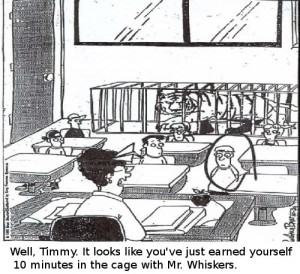Parents protest ‘time-out’ cage in classroom
(Last Updated: Friday, February 9, 2007 | 3:09 PM ET CBC News)
A Shawinigan, Que., teacher who put a nine-year-old student in a lattice cage for misbehaving will not face any disciplinary measures, school board officials said Friday.
The boy’s parents discovered their son, Félix, had been kept in a makeshift cage at Shawinigan’s École St-Paul, after he complained to them he couldn’t see the blackboard.
When they visited the school, they discovered he’d been spending several hours a week in the lattice cage….The local school board director, Claude Leclerc, told Radio-Canada the teacher did nothing wrong by using what he called a time-out area for a difficult student.
I have a few thoughts about this…as I am sure many people do.
My mind goes to a cartoon I saw on the Internet a few months ago. It is a picture of a boy, standing next to his desk, students sitting around him at their desks, and his teacher at her desk. At the back of the class is a huge cage with a pacing tiger and the caption is, “Well, Timmy. It looks like you’ve just earned yourself 10 minutes in the cage with Mr. Whiskers.”
Extreme discipline cases like this reaffirm my belief that teachers are overwhelmed with all that they need to do in a day. An act like this seems desperate to me and I think that if we took the time to think about our values as people and educators, a decision such as to put a child in a caged in area – in front of his peers no less! – would not have been made.
They also reaffirm my belief that we need to build more time into our lives as educators for professional development to help us in dealing with classroom difficulties like this and others. Personally, I think that MELS needs to provide us with time solutions (and the $$ to accompany them) to do so – especially given the present school context of inclusion, integration, and differentiation.
And so, I don’t think that the teacher needs to receive disciplinary measures. Rather, I think that she needs to receive support that will assist her in making appropriate decisions regarding discipline in her classroom. Perhaps the rest of that particular school community could use some as well.
But really, despite all that, I have to ask how could a measure like this have been instated by the teacher and school without parent permission?
I don’t know the whole story, but that is a nagging question for me.
Any thoughts?


Leave a Reply